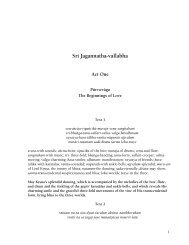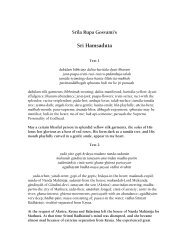Srimad Bhagavatam, Volume 3
Srimad Bhagavatam, Volume 3
Srimad Bhagavatam, Volume 3
You also want an ePaper? Increase the reach of your titles
YUMPU automatically turns print PDFs into web optimized ePapers that Google loves.
consideration of the particular case. Maharaj Parikshit was thus put into a test<br />
for his greatness and let us see how does he solves it by his sagacious mind.<br />
Suta uavach<br />
Evam dharme pravadati sa samrat dwijasattamah<br />
Samahitena manasa vikhedah paryachasta tam.<br />
Suta uvacha—Suta Goswami said, Dharme—the Personality of religiosity,<br />
Pravadati—thus spoken, Sa—he, Samrat—the emperor, Dwijasattamah—oh<br />
the best among the Brahmins, Samahitena—in proper attention, Manasa—by<br />
the mind, Vikheda—without any mistake, Paryachasta—counter replied,<br />
Tam—unto him.<br />
Suta Goswami said, oh the best among the Brahmins, the emperor<br />
Parikshit thus hearing on the Personality of religiosity so speaking, He<br />
was full satisfied in his mind and without mistake or regret he counter<br />
replied to him.<br />
The statement of the bull personality of religiosity being full of philosophy<br />
and knowledge, the king was satisfied in his mind as he could understand that<br />
the suffering bull was not an ordinary one. Unless one is not perfectly<br />
conversant with the law of the Supreme Lord, no body could speak such thing<br />
touching philosophical truths. The emperor also being on equal level of<br />
sagacity, replied just to the point without any doubts or mistake.<br />
Rajovacha<br />
Dharmam vravrishi dharmajna dharma asi vrisarupadhrik<br />
Yad adharmakritah sthanam suchakasya api tad bhavet.<br />
Rajovacha—the king said, Vravishi—as you speak, Dharmajna—like one<br />
who knows the codes of religiosity, Dharma—the personality of relgiosity,<br />
Asi—you are, Vrisarupadhrik—in the disguise of a bull, Yad—whatever,<br />
Adharmakritah—one who acts irreligiously, Sthanam—place, Suchakasya—<br />
of the identifier, Api—also, Tad—that, Bhavet—becomes.<br />
The king said, oh you are one who knows the truth of religiosity in the<br />
form of a bull, you are speaking just on the principle that the place which<br />
is fixed up for the person engaged in acts of irreligiosity, is also the place<br />
for the identifier. You are no other than the personality of religiosity.<br />
A devotee's conclusion is that no body is directly responsible for becoming<br />
benefactor or mischiefmonger without the sanction of the Lord, therefor he<br />
does not identify any one directly resposible for such action. But in both the<br />
cases he takes it for granted that either benefit or loss it is God sent and as<br />
such it is his Grace. In case of benefit, no body will deny it being god-sent but<br />
in case of loss or reverses it becomes doubful how the Lord could be unkind<br />
to his devotee as to put him in great difficulty. Jesus Christ was seemigly put<br />
into such great difficulty being crucified by the ignorant but he was never<br />
angry upon the mischief mongers. That is the way of accepting a thing, either<br />
favourable or unfavourable, by the devotee and as such for a devotee the<br />
identifier is equally a sinner like the directly mischiefmonger. As God's Grace<br />
the devotee tolerates all reverses upon him and Maharaj Parikshit observed<br />
this particular symptom of a devotee in the form a bull and therefore he could<br />
understand that the bull was no other than the personality of religiosity<br />
himself. In other words a devotee has no snffering at all; because the so called<br />
suffering is also God's Grace for a devotee who sees God in everything. They<br />
never placed any complaint before the king for being tortured by the<br />
personality of Kali although every one lodges such kind of complaints before<br />
the state authorities. The extraordinary behaviour of the bull made the king to<br />
conclude that the bull was certainly Personality of religiosity otherwise no<br />
body could understand the finer intricacies of the codes of religion.<br />
Athava deva mayaya nunam gatir agochara<br />
Chetaso vachasas cha api bhutanam iti nischayah<br />
Athava—alternatively, Deva—the Lord, Mayaya—by the energy, Nunam—<br />
very little, Gatir—movement, Agochara—inconceivable, Chetaso—either by<br />
the mind, Vachasas—by words, Cha—or, Api—also, Bhutanam—of all living<br />
beings, Iti—thus, Nischayah—concluded.<br />
Alernatively—it is thus concluded that the Lord's energies are<br />
inconcievable and no body is able to make an estimate of them either by<br />
mental speculaion or by jugglery of words.<br />
A question may be raised as to why a devotee should refrain from identifying<br />
the actor although he knows it definitely that the Lord is the ultimate doer of<br />
everything. Knowing the ultimate doer, one should not pose himself as<br />
ignorant of actual performer. To answer this doubts the reply is that the Lord<br />
is also not directly responsible because everything is done by His deputed<br />
Mayasakti or the Material energy. The material energy is always deluding<br />
doubts about the supreme authority of the Lord. The personality of religiosity<br />
did it know perfectly well that nothing can take place without the sanction of<br />
the Supreme Lord and still he was put into doubts by the deluding energy and<br />
thus he refrained from mentioning the supreme cause. This doubtfulness was<br />
due to the contamination of both Kali and the material energy. The whole<br />
atmosphere of the age of Kali is magnified by the deluding energy, and the<br />
proportion of measurement is inexplicable by any one.<br />
49<br />
Seventeenth Chapter - Punishment And Reward of Kali<br />
Tapah soucham daya satyam iti padah krite kritah<br />
Adharma amsais trayo bhagnah maya samgam madais taba.<br />
Tapah—austerity, Soucham—cleanliness, Daya—mercy, Satyamtruthfulness,<br />
Iti—thus, Padah—legs, Krite—in the age of Satya, Kritah—<br />
established, Adharma—irreligiosity, Amsai—by the parts, Trayo—three<br />
combined, Bhagnah—broken, Smaya—pride, Samgam—too much<br />
association with woman, Madais—intoxicating habit, Tava—your.<br />
"In the age of Satya (truthfulness) your four legs were established by the<br />
four principles of Austerity, Cleanliness, Mercy, and Truthfulness. But it<br />
appears that your three legs are broken on account of partially rampant<br />
irreligiosities in the matter of pride, too much affection for woman and<br />
intoxicating habit."<br />
The deluding energy or the material nature can act upon the living beings<br />
proportionately in terms of the living being's falling a prey to the deluding<br />
attraction of Maya. The deluding attraction of Maya is displayed more<br />
appropirately in terms of brightness of light and the falling of the ants. The<br />
ants are captivated by the glaring brightness of light and thus become a prey<br />
to the fire. Similarly the deluding energy is always captivating the conditioned<br />
souls to become a prey to the fire of delusion and the vedic scriptures warn<br />
the conditioned souls not to become a prey to the delusion but to get rid out of<br />
it. The Vedas warn us not to go to the darkness of ignorance but go ahead on<br />
the progressive path of light. The Lord Himself also warns that the deluding<br />
power of material energy is too powerful to be overcome but one who<br />
completely surrenders unto the Lord can easily do so. But to surrender unto<br />
the lotus feet of the Lord is also not very easy. Such surrender is possible by<br />
persons who have had cultured transcendental knowledge on the principles of<br />
austerity cleanliness, mercy and truthfulness. These four priciples of advanced<br />
civilization were remarkable features in the age of Satya. In that age every<br />
human being was practically qualified Brahmin of the highest order and from<br />
the angle of social orders of life they were all Paramhnsas or the topmen of<br />
the renounced order of life. By cultural standing, the human beings were not<br />
at all subjected to become prey to deluding enesrgy. Such strong men of<br />
character were competent enough to get away from the clutches of Maya. But<br />
gradually as and as the basic principles of Brahminical culture nam ely<br />
austerity, cleanliness, mercy and truthfulness became curtailed by<br />
proportionate development of pride, too much attachment for women and<br />
intoxicating habit, of the people in general it became prominent that the path<br />
of salvation or the path of transcendental bliss became far and far away from<br />
the human society. With the increase of the age of Kali people are becoming<br />
too much proud, too much attached to woman and too much victims of<br />
intoxiting habit. By the influence of the age of Kali even a pauper is proud of<br />
his penny, the woman as a class is always dressed in an over attractive fashion<br />
for victimising the mind of man and the man is too much adicted to<br />
intoxicating habit in the matter of drinking wine, smoking, drinking tea and<br />
chewing pan etc. All these habit or so called advancement of civilization is the<br />
root cause of all irreligiosities and, therefore, it is not possible to check<br />
corruption, bribery and nepotism as are desired by the leaders to be rooted<br />
out. You cannot check all these evils of society simply by statutory acts of<br />
police vigilance but you have to cure the disease of mind by the proper<br />
medicine namely advocating the principles of Brahminical culture or the<br />
principles of austerity, cleanliness, mercy and truthfulness. Modern<br />
civilization of economic development, is creatlng a new situation of poverty<br />
and scarcity with the result of blackmailing the consumers commodities and if<br />
the leadres and the rich men of the society spend fifty percent of their<br />
accumulated wealth mercifully for the misled mass of people and educate<br />
them in the matter of God-consciousness or in the knowledge of Bhagwatam<br />
certainly the age will be defeated in its attempt to entrap the conditioned soul<br />
to become the victim of the age of Kali. We must always remember that false<br />
pride or too much estimation of one's own values of life, undue attachment for<br />
woman or association with them and intoxicating habit of all major or<br />
description, will criple the human civilization from the path of factual peace<br />
however the people may go on clamouring for such peace of the world. The<br />
preaching of Bhagwatam principles will automatically render all men<br />
practised to austerity, become clean both inside and out side, merciful to the<br />
suffering men and truthful in daily behaviour. That is the way of correcting<br />
the flaws of human society very prominently exhibited at the present moment.<br />
Idanim dharma padas te satyam nirvartayet yatah<br />
Tam jighrikshati adharma ayam anritena edhitah kalih.<br />
Idanim—at the present moment, Dharma—oh the personality of religiosity,<br />
Padas—legs, Te—of you, Satyam—truthfelness Nirvartayet—may pull on<br />
some how or other, Yatah-whereby, Tam—that, Jigrikshati—trying to<br />
withdraw, Adharma—the personality of irreligiosity, Ayam—this, Anritena—<br />
by false representation, Edhitah—flourishing, Kalih—the quarrel personfied.<br />
You are just standing on one leg or by one part of your existing<br />
truthfulness and you are some how or other pulling on with this but this<br />
quarrel-personified, being flourished by false representations, is trying to<br />
with draw that also.












